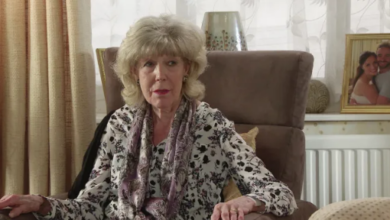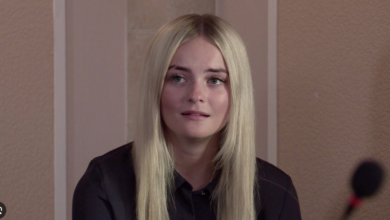Coronation Street stars in panic as their hours are cut by ITV bosses to save cash

Coronation Street show bosses are also said to have slashed the number of extras used, and increased back-to-back filming – when actors start on set at 7am and film all day
Cash-strapped Coronation Street bosses have sparked massive panic by reducing the number of stars who can appear in each storyline.
Sources have revealed ITV chiefs faced with shrinking budgets are scaling down costs by adopting a “minimal” approach and cutting down on group scenes, such as those filmed in the Rovers Return. But the move has created a backlash among some of the soap’s stars – many of whom are paid by the scene. They are said to have become aware of a marked difference in the scripts last month.
It comes as show bosses are also said to have slashed the number of extras used, and increased “back-to-back” filming – when actors start on set at 7am and film all day. One insider said: “The bosses have decided we will take a far more minimal approach to storylines going forward, and are cutting the number of actors who appear in them. As large numbers of the cast are paid by scene, that means paying fewer actors to be on set.
“The changes haven’t gone down well with the cast. Many of them are panicking about what these cuts mean for their futures. The Corrie cast is absolutely massive – it has well over 50 cast members in total – and some of them haven’t filmed for weeks, so they are starting to get really worried about the axe falling on them before long. There is currently a real feeling of disquiet behind the scenes and people are openly sharing their concerns.”
Reducing the number of actors in scenes will save bosses money on travel – getting actors to the set in cars – hair and make-up, and lighting, the source revealed. They went on: “The more these costs are reduced, the more likely it is that we can meet them with our in-house team, whereas previously the show has leaned heavily on freelance help, which is much more expensive.”
Insiders told how under-pressure bosses at the ITV soap, which has just over three million viewers, have opted for a more streamlined approach rather than cutting the number of episodes airing each week. In meetings with senior executives, they are said to have stressed the importance of minimising the impact on fans. But the move has sent cast morale plummeting, as actors are spending more time off set, and are working longer hours when they are in.
Older stars such as Bill Roache and Barbara Knox, who play Ken Barlow and Rita Tanner, are fully salaried and paid regardless of their hours. But the majority of the cast are paid for the time they are filming – although they are guaranteed a minimum amount of work.
A second source said: “In the past, actors would come in for short periods over a number of days. But now they are in from 7am until late, filming back-to-back scenes, and could be standing in when in the past extras might have been used. But then they might be off set for ages. The bosses are clearly trying to cut down on additional costs that are deemed surplus to requirements, which makes a lot of sense when you look at the pressures being felt all across the industry. But it has been quite unsettling for the cast and crew, and it feels like a very uncertain time.”
Corrie, which aired for the first time in 1960, has long been seen as a British institution, capable of pulling in more than 20million viewers an episode at its peak in the 1980s. Writers introduced fans to iconic characters such as Ken and Deirdre Barlow, Jack and Vera Duckworth, Ena Sharples, Bet Lynch, and Elsie and Rita Tanner.
In recent years its success has been cemented by budget-busting Hollywood stunts, such as the 2010 50th anniversary storyline in which a gas explosion destroyed a viaduct, sending a tram crashing onto the cobbles. An arsenal of special effects made the episodes the most expensive in ITV history at the time, reportedly coming in at over £5million.
In 2021, ITV handed Corrie bosses a blank cheque to create an unmissable week of drama and danger, leaving 11 characters fighting for their lives after a rainstorm, a sinkhole and a fireball car crash. But sources say such expensive episodes are likely to be out of the question in future, as the soap has haemorrhaged viewers following increased competition as streaming services such as Netflix, Amazon Prime and Apple TV expand.
Last year the Christmas episode – previously a staple of the festive telly schedule – pulled in an audience of just 2.6million. And with reduced numbers of viewers, Coronation Street has struggled to secure the big-money sponsorship it enjoyed in the past. Earlier this year supermarket Co-op, which had partnered with the show since 2018 and introduced a branch to Weatherfield, announced it was saying “ta-ra” to the relationship.
The insider continued: “Corrie is still an incredibly well-loved TV show, and its characters, wit and warmth have stood the test of time. But the reality is that the kind of viewing figures it achieved at its peak are no longer possible in today’s market. This is the challenge that all of the soaps now face. Where once there were four channels there are now 4,000, and Corrie can no longer be the titan it used to be – it must adapt. This is what the bosses are trying to do. They want to cut costs as much as they can, without tearing apart the fabric of the show. And they are urging scriptwriters to come up with hard-hitting storylines which do not need scores of actors to have an impact.”
Former Emmerdale producer Kate Brooks will take charge of the show this month, following the promotion of former boss Iain McLeod to executive producer of continuing drama. Kate said last month: “Corrie has lit up my living room since I was a kid, so to be asked to produce a show I’ve revered for such a long time is the ultimate ‘pinch me’ moment. It truly is a special show and I endeavour to take great care to ensure that it continues to thrive as we head into the next chapter.”
A Corrie spokesman said: “We do not comment on production schedules or costs.”






